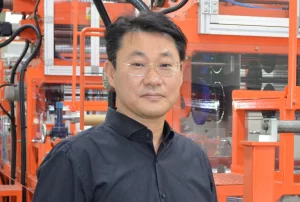_700.webp)
Carbon Fiber Composites (CF-SMC)
Excellent formability
Lightweight
Replacement for aluminum cast products
Forming speed: approx. 1minute per 1mm thickness
Carbon Fiber Composites (CF-SMC)
ILSUNG’s CF-SMC offers one-stop production with high quality and efficiency, recycling CFRP waste through proprietary technology. With rapid molding (1 min per mm) and excellent formability, it enables mass production while providing lightweight yet strong performance.
Specific gravity :
1.5~1.7
Resin Type :
Vinyl Ester
Fiber Content :
50 wt.%
Fiber Type :
Toray T700 12K
Fiber Length :
2inch
Tensile Strength :
265MPa
Flexural Strength :
481MPa
The above data may vary depending on the test environment and raw materials.
Description
Description
1. Integrated Production System
Equipped with in-house CF-SMC compression molding equipment, we provide a complete one-stop solution—from sheet production to final composite molding—tailored to customer requirements. This ensures both exceptional quality and production efficiency. In line with ESG management, we also utilize our proprietary recycled carbon fiber technology to recycle CFRP waste generated during CF-SMC production.
2. Moldability & Productivity
ILSUNG’s carbon fiber SMC technology offers superior moldability compared to conventional continuous CFRP and aluminum. With a rapid curing speed of about 1 minute per 1 mm thickness, it enables high-speed, mass production. Complex and precise geometries can be molded reliably, delivering strong competitiveness for both simple and highly engineered components.
3. Exceptional Lightweight Performance
CF-SMC has a lower density than aluminum castings while maintaining high mechanical strength, delivering the optimal lightweight solution for industries where weight reduction is critical.
4. Balanced Performance
This technology not only achieves lightweight properties but also ensures a well-balanced combination of mechanical strength, corrosion resistance, dimensional stability, and durability. It maintains stable performance under extreme environments and repeated loads, making it highly suitable for automotive, aerospace, and defense applications where reliability is critical.
5. Cost Competitiveness
Compared to CFRP, it provides a lower-cost structure and high-speed molding capability, ensuring excellent price competitiveness. This significantly improves cost efficiency in industries that demand large-scale production—such as automotive, aerospace, and defense—and strengthens its growth potential within the composites market.
Equipped with in-house CF-SMC compression molding equipment, we provide a complete one-stop solution—from sheet production to final composite molding—tailored to customer requirements. This ensures both exceptional quality and production efficiency. In line with ESG management, we also utilize our proprietary recycled carbon fiber technology to recycle CFRP waste generated during CF-SMC production.
2. Moldability & Productivity
ILSUNG’s carbon fiber SMC technology offers superior moldability compared to conventional continuous CFRP and aluminum. With a rapid curing speed of about 1 minute per 1 mm thickness, it enables high-speed, mass production. Complex and precise geometries can be molded reliably, delivering strong competitiveness for both simple and highly engineered components.
3. Exceptional Lightweight Performance
CF-SMC has a lower density than aluminum castings while maintaining high mechanical strength, delivering the optimal lightweight solution for industries where weight reduction is critical.
4. Balanced Performance
This technology not only achieves lightweight properties but also ensures a well-balanced combination of mechanical strength, corrosion resistance, dimensional stability, and durability. It maintains stable performance under extreme environments and repeated loads, making it highly suitable for automotive, aerospace, and defense applications where reliability is critical.
5. Cost Competitiveness
Compared to CFRP, it provides a lower-cost structure and high-speed molding capability, ensuring excellent price competitiveness. This significantly improves cost efficiency in industries that demand large-scale production—such as automotive, aerospace, and defense—and strengthens its growth potential within the composites market.

Share
Recent Chats
Share via email
Future: handle WhatsApp here
Future: handle LinkedIn here
Future: handle Twitter here
SUBMENU HERE
Share via Chat
Copy Link

